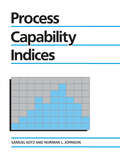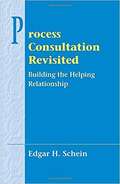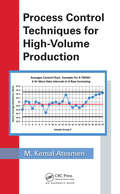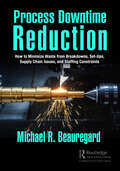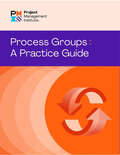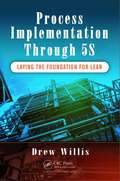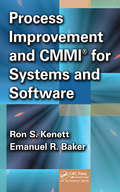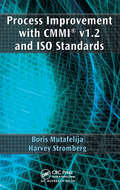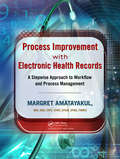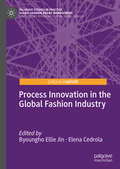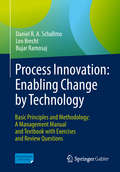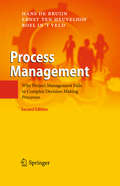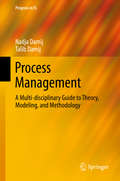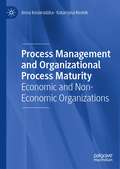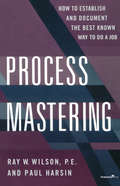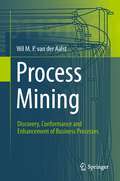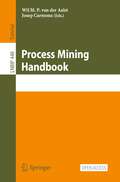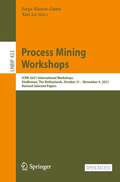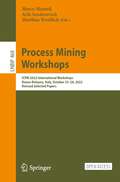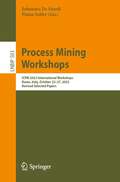- Table View
- List View
Process Capability Indices: A Comprehensive Exposition Of Quality Control Measures (Series On Quality, Reliability And Engineering Statistics #Vol. 12)
by Samuel Kotz Norman L. JohnsonA solid, rigorous, yet comprehensible analysis of process capability indices, this work bridges the gap between theoretical statisticians and quality control practitioners, showing how an understanding of these indices can lead to process improvement.
Process Consultation Revisited: Building The Helping Relationship (Process Consultation Series #3)
by Edgar ScheinA new member of the renowned PH OD Series! The latest addition to the author’s well-loved set of process consultation books, this new volume builds on the content of the two that precede it while expanding to explore the critical area of the helping relationship. Process Consultation Revisited focuses on the interaction between a consultant and client, and explains how to achieve a healthy helping relationship. Whether the advisor is an OD consultant, therapist, social worker, manager, parent, or friend, the dynamics between advisor and advisee can be difficult to understand and manage. Schein creates a general theory and methodology of helping that will enable a diverse group of readers to navigate the helping process successfully.
Process Control Techniques for High-Volume Production
by M. Kemal AtesmenThis book details most common statistical process control tools with many examples for high-volume production. It aims to make elements of high-volume production process control simple and easy to understand. It lets you thoroughly understand process controls instead of blindly trusting software tools that operate as black boxes. If you are dealing with high-volume production as an operator, line supervisor, inspector, process engineer, quality engineer, manufacturing manager, plant manager, or president of the company, you have to understand the statistical process control basics explained in this book in order to be successful.
Process Control at Polaroid (A)
by Steven C. Wheelwright H. Kent Bowen Brian ElliottDescribes the initial efforts at a film production plant to shift from a traditional QC inspection mentality to a worker-based process control mentality. Students can prepare SPC charts, propose actions needed, and combine steps into an overall action plan.
Process Downtime Reduction: How to Minimize Waste from Breakdowns, Set-Ups, Supply Chain Issues, and Staffing Constraints
by Michael R. BeauregardAmong the biggest mistakes manufacturers make is not keeping key equipment and processes running and making saleable product when needed. This situation existed when the author Mike Beauregard began working in manufacturing years ago and it currently remains true in companies ostensibly focusing on Lean. To improve, companies often rely on increasing productivity by making products faster and with more automation, but many fail to focus on the area in which they can get the biggest gains for their efforts – the reduction of downtime. This book provides readers the techniques they crucially need to keep their critical manufacturing equipment running correctly and efficiently -- which increases production, decreases labor costs, decreases breakdown costs, and ultimately increases the bottom line. Downtime in production lines stems from many sources. The contribution might be small for many of those sources, but it adds up. Downtime and its causes then insidiously become the norm, accepted, unseen by the workforce and the management team. Most training courses and books look at a specific cause of downtime – mainly, either product changeover (set-up reduction) or breakdowns (TPM). This book addresses these two areas and many other sources of downtime including how to decrease downtime caused by supply chain issues, staffing issues, and downtime internal to the processes themselves. In the final chapter, the author covers how to manage the downtime reduction effort – how to measure downtime, prioritize which downtime sources to attack first, and monitor the improvement
Process Enhancement Work: Leveraging Quality for Competitive Advantage
by Bart Victor Andrew C. BoyntonAchieving quality through the process enhancement capability is a powerful source of market advantage. This chapter outlines the benefits of process enhancement and addresses several important issues that are fundamental to its success.
Process Fundamentals
by James Leonard Ann E. GrayThis note provides an introduction for a course or module covering the basic elements of production or service operations and how processes are managed. Begins by discussing the activities that take place in a "process." Analysis tools such as the process flow diagram are provided. The types of management choices involved in designing, operating, and improving processes are described. Measures of process performance and basic process analysis are introduced. The different cost structures, capabilities, and performance characteristics of alternative types of processes are touched upon. Finally, the note focuses briefly on the complexity stemming from uncertainty and variability in processes and their external environments. A rewritten version of an earlier note.
Process Groups: A Practice Guide
by Project Management InstituteNeed help on how to get work done using traditional project management practices? Then, Process Groups: A Practice Guide is the right supplemental guide for you. This important companion to A Guide to the Project Management Body of Knowledge (PMBOK® Guide), offers useful and practical guidance for a predictive approach to project management practices. This practice guide influences your way of working, ensuring you are equipped with the information you need to succeed in this changing profession. What's in the guide? You'll find a process-based project management approach for guiding your projects, aligning methodologies, and evaluating project management capabilities. This guide uses a popular Process Groups model that will help you with: · Initiating · Planning · Executing · Monitoring and Controlling · Closing In addition, you will learn about 49 processes within these five process groups along with inputs, tools and techniques, and outputs associated with those processes. This practice guide shows the processes considered good practices on most projects, most of the time.
Process Implementation Through 5S: Laying the Foundation for Lean
by Drew WillisProcess Implementation Through 5S: Laying the Foundation for Lean explains how to implement standardized work and visual controls through Plan Do Check Adjust (PDCA). The author uses PDCA to outline the book and explains how 5S (Sort, Straighten, Shine, Standardize, and Sustain) and Standardization are not only foundational parts of the PDCA for yo
Process Improvement Template
by Steven J. SpearManagers are often confronted with the challenge of improving critical business processes so that their efforts are not merely ad hoc. This note provides a template by which improvement efforts are converted from unstructured efforts to bona fide, hypothesis-testing experiments that lead not only to process improvement but to the creation of broader and deeper understanding of how the process works. This is a tool for system improvement, learning, and creation of learning systems.
Process Improvement and CMMI for Systems and Software
by Ron S. Kenett Emanuel BakerProcess Improvement and CMMI for Systems and Software provides a workable approach for achieving cost-effective process improvements for systems and software. Focusing on planning, implementation, and management in system and software processes, it supplies a brief overview of basic strategic planning models and covers fundamental concepts and appr
Process Improvement with CMMI v1.2 and ISO Standards
by Boris Mutafelija Harvey StrombergIn this age of globalization, process improvement practitioners must be able to comprehend and work with the different standards and frameworks used around the world. While many systems and software engineering organizations rely on a single standard as the primary driver of process improvement efforts (CMMI-based process improvement in the U.S. an
Process Improvement with Electronic Health Records: A Stepwise Approach to Workflow and Process Management
by Margret AmatayakulAlthough physicians and hospitals are receiving incentives to use electronic health records (EHRs), there is little emphasis on workflow and process improvement by providers or vendors. As a result, many healthcare organizations end up with incomplete product specifications and poor adoption rates.Process Improvement with Electronic Health Records:
Process Improvement with Electronic Health Records: A Stepwise Approach to Workflow and Process Management
by Margret AmatayakulAlthough physicians and hospitals are receiving incentives to use electronic health records (EHRs), there is little emphasis on workflow and process improvement by providers or vendors. As a result, many healthcare organizations end up with incomplete product specifications and poor adoption rates.Process Improvement with Electronic Health Records: A Stepwise Approach to Workflow and Process Management walks you through a ten-step approach for applying workflow and process management principles regardless of what stage your organization is in its EHR journey. Introducing workflow and process mapping as essential elements in healthcare improvement, it includes detailed guidance, helpful tools, and case studies in each chapter. It also: Compares EHR workflow and process management to other continuous quality improvement methodologies Highlights the processes that need to be addressed in EHR workflow and process redesign Describes the level of detail necessary for workflow and process mapping to be effective Explains how to create change agents and offers time-tested change management tools The book describes the process for getting stakeholders to create, document, and validate new workflows and processes. Using case studies to illustrate the unique requirements of health information technology (HIT) and EHR acquisition, this reference provides you with simple yet powerful tools along with step-by-step guidance for the effective use of workflow and process mapping within healthcare.
Process Innovation in the Global Fashion Industry (Palgrave Studies in Practice: Global Fashion Brand Management)
by Elena Cedrola Byoungho Ellie JinProcess innovations - an improved way of doing things – help firms achieve higher-level performance by reducing the time and cost to produce a product or perform a service, and increasing productivity and growth. This book provides a comprehensive examination of process innovations occurring in the global fashion industry, with a focus on fashion brands from USA, Italy, and Japan. It offers practical insights for enhancing efficiency in the supply chain as well as management process such as work routines, information flow, and organization structures. Using case analyses, this book will help readers to grasp how successful fashion companies optimize their operations and advance their competitive position by integrating process innovations into their supply chain and management systems.
Process Innovation: Basic Principles And Methodology: A Management Manual And Textbook With Exercises And Review Questions
by Daniel R. A. Schallmo Leo Brecht Bujar RamosajThis management manual and textbook introduces the theoretical basics of process management and provides a procedural model for process innovation. The procedural model makes it possible to develop customer-oriented processes in a structured manner and to design them in order to meet changing requirements. This textbook has been recommended and developed for university courses in Germany, Austria and Switzerland.This book enables readers to understand and apply the seven phase procedural model for process innovation in order to design and implement innovative processes.Exercises and review questions test understanding of the theoretically acquired knowledge.
Process Management
by Roel in 't Veld Ernst Ten Heuvelhof Hans De BruijnWhat is it that makes a manager or a politician a successful decision maker? Our first inclination would be to say decisiveness and substance. Many managers who met those criteria, however, had to abandon the field in the past several years. The authors of Process Management regard a manager as successful if he pays much attention to the process aspects of change. Successful management depends on the extent to which the
Process Management
by Nadja Damij Talib DamijProcess management affects the functioning of every organization and consequently affects each of us. This book focuses on the multi-disciplinary nature of process management by explaining its theoretical foundations in relation to other areas such as process analysis, knowledge management, and simulation. A crucial linkage between theory and concrete methodology of Tabular Application Development (TAD) is presented as a practical approach consisting of five phases that deal with process identification and modeling, process improvement, development of a process management system and finally - monitoring and maintenance. This book is important for researchers and students of business and management information systems, especially those dealing with courses on process management or related fields. Managers and professionals in process management will also find this book to be useful for their everyday business.
Process Management and Organizational Process Maturity: Economic and Non-Economic Organizations
by Katarzyna Rostek Anna KosieradzkaThis book addresses the need for a better understanding of the design, implementation and improvement of process management. It presents and organizes concepts and problems in the field of process management, and indicates supporting tools assigned to each of the four basic stages of the process life cycle (modeling, implementation, verification and perfection). By comparing non-economic and economic organisations, the authors demonstrate that a uniform approach to process management (one that does not take into account the specifics of an organizations goals) is ineffective; instead, process management needs to account for the individuality of an organisation. This book will appeal to researchers studying process and organizational excellence.
Process Mastering: How to Establish and Document the Best Known Way to Do a Job
by Paul HarsinThe benefits include: cost reduction; increased productivity; improved safety; higher morale; and the ability to meet the changing expectations of your customers.Step-by-step, the authors guide you through the creation and implementation of a process master. You will learn:Identify and gain control of your organization's key processes.Get the right people involved.Establish boundaries and measures.Use the process master to support ISO and HACCP complianceProcess Mastering contains two fully completed sample Process Masters as well as numerous improvement examples. An appendix provides blank Process Master forms and shows you how to use a Deployment Flow Chart.
Process Mining
by Wil M. van der AalstThe first to cover this missing link between data mining and process modeling, this book provides real-world techniques for monitoring and analyzing processes in real time. It is a powerful new tool destined to play a key role in business process management.
Process Mining Handbook (Lecture Notes in Business Information Processing #448)
by Wil M. P. van der Aalst Josep CarmonaThis is an open access book. This book comprises all the single courses given as part of the First Summer School on Process Mining, PMSS 2022, which was held in Aachen, Germany, during July 4-8, 2022. This volume contains 17 chapters organized into the following topical sections: Introduction; process discovery; conformance checking; data preprocessing; process enhancement and monitoring; assorted process mining topics; industrial perspective and applications; and closing.
Process Mining Workshops: ICPM 2021 International Workshops, Eindhoven, The Netherlands, October 31 – November 4, 2021, Revised Selected Papers (Lecture Notes in Business Information Processing #433)
by Jorge Munoz-Gama Xixi LuThis open access book constitutes revised selected papers from the International Workshops held at the Third International Conference on Process Mining, ICPM 2021, which took place in Eindhoven, The Netherlands, during October 31–November 4, 2021. The conference focuses on the area of process mining research and practice, including theory, algorithmic challenges, and applications. The co-located workshops provided a forum for novel research ideas. The 28 papers included in this volume were carefully reviewed and selected from 65 submissions. They stem from the following workshops: 2nd International Workshop on Event Data and Behavioral Analytics (EDBA) 2nd International Workshop on Leveraging Machine Learning in Process Mining (ML4PM) 2nd International Workshop on Streaming Analytics for Process Mining (SA4PM) 6th International Workshop on Process Querying, Manipulation, and Intelligence (PQMI) 4th International Workshop on Process-Oriented Data Science for Healthcare (PODS4H) 2nd International Workshop on Trust, Privacy, and Security in Process Analytics (TPSA)One survey paper on the results of the XES 2.0 Workshop is included.
Process Mining Workshops: ICPM 2022 International Workshops, Bozen-Bolzano, Italy, October 23–28, 2022, Revised Selected Papers (Lecture Notes in Business Information Processing #468)
by Matthias Weidlich Marco Montali Arik SenderovichThis open access book constitutes revised selected papers from the International Workshops held at the 4th International Conference on Process Mining, ICPM 2022, which took place in Bozen-Bolzano, Italy, during October 23–28, 2022. The conference focuses on the area of process mining research and practice, including theory, algorithmic challenges, and applications. The co-located workshops provided a forum for novel research ideas. The 42 papers included in this volume were carefully reviewed and selected from 89 submissions. They stem from the following workshops: – 3rd International Workshop on Event Data and Behavioral Analytics (EDBA)– 3rd International Workshop on Leveraging Machine Learning in Process Mining (ML4PM)– 3rd International Workshop on Responsible Process Mining (RPM) (previously known as Trust, Privacy and Security Aspects in Process Analytics)– 5th International Workshop on Process-Oriented Data Science for Healthcare (PODS4H)– 3rd International Workshop on Streaming Analytics for Process Mining (SA4PM)– 7th International Workshop on Process Querying, Manipulation, and Intelligence (PQMI)– 1st International Workshop on Education meets Process Mining (EduPM)– 1st International Workshop on Data Quality and Transformation in Process Mining (DQT-PM)
Process Mining Workshops: ICPM 2023 International Workshops, Rome, Italy, October 23–27, 2023, Revised Selected Papers (Lecture Notes in Business Information Processing #503)
by Pnina Soffer Johannes De SmedtThis volume constitutes the revised selected papers of several workshops which were held in conjunction with the 5th International Conference on Process Mining, ICPM 2023, held in Rome, Italy, in October 23–27, 2023.The 38 revised full papers presented in this book were carefully reviewed and selected from 85 submissions. The book also contains one invited talk. ICPM 2023 presented the following six workshops:– 4th International Workshop on Event Data and Behavioral Analytics (EdbA)– 4th International Workshop on Leveraging Machine Learning in Process Mining (ML4PM)– 6th International Workshop on Process-Oriented Data Science for Healthcare (PODS4H)– 8th International Workshop on Process Querying, Manipulation, and Intelligence (PQMI)– 2nd International Workshop on Education Meets Process Mining (EduPM)– 2nd International Workshop on Collaboration Mining for Distributed Systems (COMINDS).
